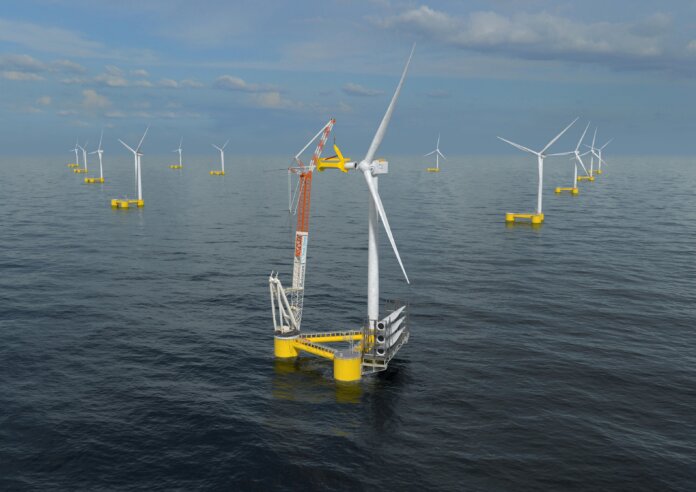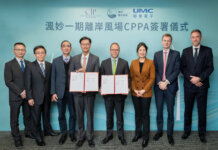Fred. Olsen 1848 and Huisman have signed a memorandum of understanding for a floating maintenance solution that aims to solve the challenge of major component exchange at a floating wind site.
Fred. Olsen 1848 has innovated a complete solution and operational procedure for major component exchange for floating wind turbines. To develop the crane required for such operation, Fred. Olsen 1848 turned to Huisman, a company specialized in tailor-made lifting solutions. The complete solution enables the exchange of turbine components at the offshore site and further removes the need for dynamic lifts when performing the component exchange offshore, which are both expensive and entail high operational risk.
“Innovation and collaboration are key to realizing commercial development of floating offshore wind,” says Sofie Olsen Jebsen, CEO of Fred. Olsen 1848. “We have worked to solve the maintenance challenge in floating wind by building on the decade-long experience with O&M operations from our sister companies Fred. Olsen Windcarrier and Global Wind Service. The present floating wind component exchange solutions are too costly in terms of assets required, downtime of the turbine and available weather windows. We believe the floating maintenance solution will be a game-changer in the market and can enable the industrialization of floating offshore wind”.
“We are thankful that Fred. Olsen 1848 has selected us as their partner for realizing their ambition to accelerate the maturity of the floating wind market,” states David Roodenburg, CEO of Huisman. “The combination of Fred. Olsen 1848’s dedication to innovation and the Fred. Olsen related companies’ extensive experience in O&M operations, together with Huisman’s capabilities in designing and building cranes to specific client needs has led to this unique crane setup.”
The development of the floating maintenance solution is now entering a new phase, where the next milestone is to conclude a detailed project FEED study with the aim of bringing the solution into operation before the end of this decade.
The solution includes a component exchange carried out on site with no need to disconnect the foundation and tow to port. It is positioned on the floating structure with the crane operating with the same motions as the floating foundation. No dynamic lifts are required to perform the component exchange. The design is agnostic and compatible with most semi-submerged floating structures. No modifications are needed on the tower or WTG as well as minimal modifications to the floating foundation. In-field deployment of the crane can be performed by a regular offshore support vessel.
The crane engineered and developed by Huisman features an expandable main boom and a foldable knuckle boom integrated in a compact self-supporting setup, to be transported safely and efficiently. It has a unique quick connection system, allowing the crane to be deployed in multiple lightweight modules, and such that it can be quickly deployed on any floating foundation prepared for this setup. The all-electric drive system results in high positioning accuracy, low energy use, reduced maintenance and high reliability. The dedicated energy storage system allows the crane’s power supply to come from the turbine’s auxiliary circuits, yet having sufficient energy available for crane operations.




